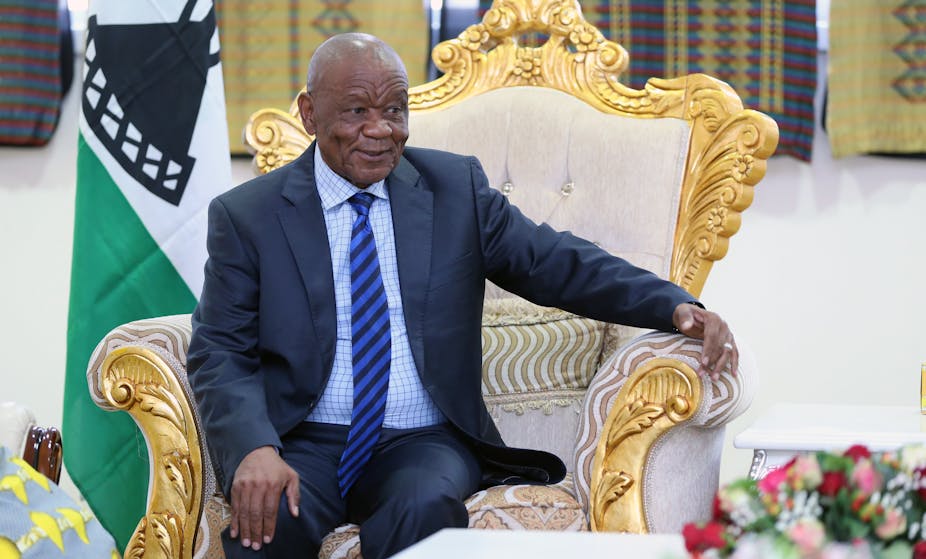Recent reports saying Lesotho’s prime minister, Tom Thabane, has agreed to an immediate retirement are proving premature. He has now made it plain that he’s going nowhere and is continuing to play for time to ensure his personal safety. This has been phrased as the need to guarantee him a “dignified and secure retirement”.
We may presume that Thabane will be insisting that this will provide him with a guarantee of immunity from prosecution for his alleged role in the murder of his estranged first wife Lipolelo Thabane. But those wanting him out of office are seemingly not prepared to commit themselves to that – yet.
Lipolelo Thabane was shot dead in June 2017, two days before Tom Thabane’s inauguration as prime minister of the tiny kingdom, which is completely landlocked by South Africa. He was, at the time, involved in a relationship with the woman he was later to marry. His new wife, Maesaiah Thabane, was charged with Lipolelo’s murder in February this year. The prime minister was later also charged with the murder.
The long running crisis surrounding Thabane came to a head after he deployed the army on the streets of the capital, Maseru, on the weekend of 18-19 April. He claimed this was necessary to restore order against “rogue elements” wanting to destabilise the nation.
Yet this was manifestly a move by Thabane to strengthen his hand and defy the recent agreement around his immediate departure. This is a bad move for democracy in the country and people’s trust in its institutions.
Dramatic developments
The deployment of the army followed dramatic political developments.
Firstly, coalition partners and major figures within Thabane’s own All Basotho Congress challenged his earlier decision, without consultation, to suspend parliament over the coronavirus pandemic. The constitutional court ruled that his decision was “irrational” and unconstitutional.
The court’s decision meant that all bills that were pending before parliament could be concluded. These include a constitutional amendment that strips the prime minister of powers to unilaterally dissolve parliament and call for elections if he loses a vote of no confidence. Passage of the amendment would enable the national assembly to force Thabane to resign in the event he lost such a vote of no confidence.
Read more: What Lesotho's constitution says about immunity for a sitting prime minister
Secondly, in March the high court of Lesotho interdicted Thabane’s earlier suspension of the commissioner of police, Holomolo Molibeli. The police chief had been spearheading the investigation into Thabane’s alleged involvement in the murder of his estranged wife. The court had ruled the suspension invalid.
The deployment of the army was accompanied by Thabane’s order of the arrest of the police commissioner, his deputy Paseka Mokete, and assistant commissioner Beleme Lebajoa by military police. Thabane claimed the move was necessary to facilitate investigations against the police boss, after a case of perjury had been filed against him by one of his subordinates. But in a move which indicated the increasing fragility of Thabane’s hold on power, Lesotho defence force commander Lt General Mojalefa Letsoela defied orders to arrest the trio of senior police.
Yes he will, no he won’t
With his hands full managing the coronavirus crisis in his own country, South African president Cyril Ramaphosa – charged by the Southern African Development Community with mediating political tensions in Lesotho – cannot have been pleased with this latest distraction.
But he may be forgiven if he regarded Thabane’s latest attempts as a blatant attempt to thwart democracy and stay in power courtesy of the army. In a country which has seen multiple military coups and attempted coups, this was clearly a major threat to peace and order in Lesotho.
Accordingly, Ramaphosa immediately dispatched a former senior minister, Jeff Radebe, as his envoy to help defuse the latest crisis.
Matters moved fast, and Radebe was enabled to swiftly announce agreement by the coalition government and political parties that Thabane would be allowed a dignified retirement.
It was reported that Thabane would stand down immediately. But days later, he was stating that he would not be pushed out of office before he was ready.
Power is visibly draining away from Thabane. But, even close to 81 years old, he remains a wily operator, and it would seem that he is determined to cause maximum trouble to secure his immunity from prosecution.
He already has an application before the constitutional court challenging the constitutionality of the bringing of murder charges against a sitting prime minister. No date has been set for the outcome. But it may be reckoned that Thabane calculates that retaining his power until that time will assist his cause.
He may be hoping that his deputy prime minister, Monyane Moleleki, leader of his main coalition partner, the Alliance of Democrats, will manage to cobble together a successor coalition along with other political parties, notably the Basotho National Party and the Reformed Congress of Lesotho. Such a coalition might then offer Thabane the protection he’s seeking. But the chances of Moleleki succeeding him remain thin.
Read more: Events in Lesotho point to poor prospects for political stability
Following his suspension of parliament, the majority of MPs within his own party signed a memorandum of understanding with the opposition Democratic Congress, which has 26 MPs, to vote together to elect a successor to Thabane, and to form a new coalition.
Although it is reckoned that Thabane retains the support of around 18 MPs from his own party, this would not be enough to save him from a defeat in parliament, and being forced to resign.
What happens next remains unclear. But what’s certain is that Thabane’s latest antics are further undermining the trust of the Basotho people in their political institutions and the politicians who control them.
It also risks the danger that incumbent prime ministers will be able to “get away with murder” – literally.

